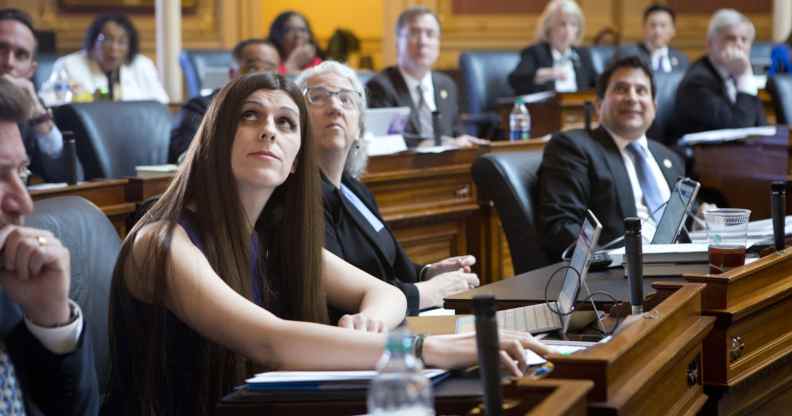Virginia just became the 12th state to officially ban gay and trans panic defences

Danica Roem looks up to see how the House of Delegates voted on an amendment Wednesday, April 3, 2019 in Richmond, Va. (Julia Rendleman for The Washington Post via Getty Images)
Virginia has become the 12th state to ban the gay and trans “panic” defence, with governor Ralph Northam signing the bill into law on Wednesday (31 March).
The move coincided with International Transgender Day of Visibility and marked a large step forward in LGBT+ rights in the state. The so-called “panic” defence is a legal strategy that asks a jury to find that a “victim’s sexual orientation or gender identity/expression is to blame for a defendant’s violent reaction, including murder”, according to the National LGBT Bar Association.
The ban was introduced by trailblazing trans lawmaker Danica Roem, and the bill passed the state House 58-42 and Senate 23-15 in February.
Governor Northam signed the bill into law on Wednesday, and Roem celebrated the news on Twitter. She wrote: “Thank you to my team, the advocates who testified, my colleagues who voted for it and my 15-year-old out student constituent in Manassas Park who requested it.”
The LGBTQ+ panic defense is now banned in Virginia.@GovernorVA just signed my bill HB 2132 to make it happen.
Thank you to my team, the advocates who testified, my colleagues who voted for it and my 15-year-old out student constituent in Manassas Park who requested it.🏳️⚧️🏳️🌈 pic.twitter.com/W81Siwyyqo
— Sen. Danica Roem (@pwcdanica) March 31, 2021
Northam responded to the tweet, saying he is “proud to sign this legislation, especially on #TransDayOfVisibility.” He also included a GIF of the trans flag with the words “trans rights are human rights” alongside his tweet.
Proud to sign this legislation, especially on #TransDayOfVisibility. https://t.co/QX9g3aIZaU pic.twitter.com/SSRpbGvhD8— Governor Ralph Northam (@VAGovernor73) March 31, 2021
Testimony in favour of the Virginia ban was provided by Judy Shepherd, mother of Mathew Shepherd, a gay student who was tortured and murdered in 1998. LGBT+ advocacy organisation Out & Equal also provided testimony.
The LGBT+ “panic” defence has been banned in 12 states – including Virginia, Hawaii and Illinois – and Washington DC.
Legislation against the gay and trans “panic” defence has been introduced, but not yet passed, in a further 13 states. Iowa, Maryland, Nebraska, Florida, Oregon, New Mexico, Vermont, New Hampshire, Minnesota and Massachusetts all introduced legislation that would ban LGBT+ “panic” defence in 2021.
Maryland might become the next state to ban the gay and trans “panic” defence after the state’s House unanimously passed a bill in favour of the ban in March. The Washington Blade reported that the Senate judicial proceedings committee is expected to vote on the bill in the coming weeks.

